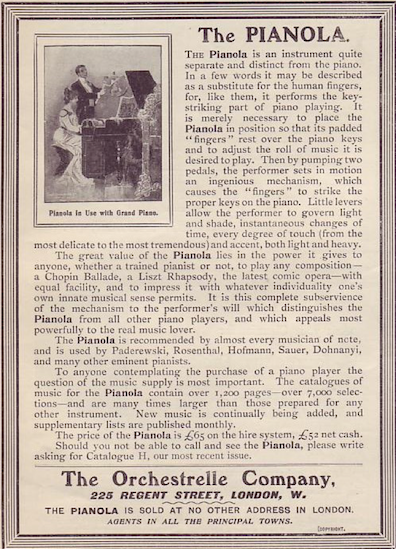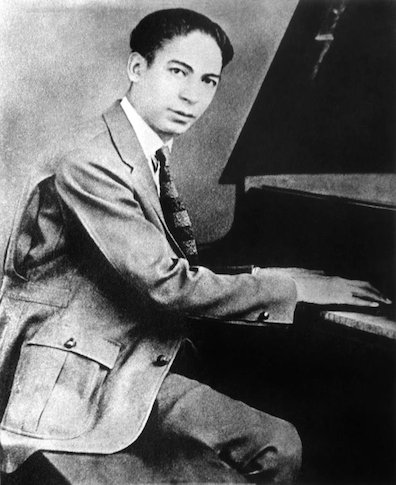In Circe, as Zoe and Bloom stand talking in the
street outside Bella Cohen's bordello, she asks him, "Are you
coming into the musicroom to see our new pianola? Come and
I'll peel off." Inside, Zoe and Stephen plunk around on this
expensive novelty, and later a hallucinated Professor Goodwin
plays it with wild abandon. Finally, as the action grows
wilder still, the pianola springs to life as a character,
playing and singing My
girl's a Yorkshire girl. The pianola was an
automated piano-playing device that achieved wide popularity
in the US and UK in the early 20th century. It is hard to say
exactly what kind of device Bella owns, given some strange
details in Circe.
“Pianola” was the
trade name for piano-playing devices manufactured and
distributed by the Aeolian Company of New York beginning in the
late 1890s. Precursor of the fully integrated player piano, the
pianola was a moveable accessory positioned to cover the
keyboard of an ordinary piano. As the operator pumped foot
pedals to generate pneumatic pressure, suction-activated
mechanical "fingers" pressed the keys of the piano, controlled
by perforations in a paper roll wrapped around a rotating drum.
In the days before phonographs and radio, the parlor piano was
where middle-class music was made, and in the absence of a
skilled player, the pianola could enliven the guests on its own.
Music rolls in various styles could be purchased, and eventually
featured actual performances by famous artists. But pianolas
offered more than rote playback. They were equipped with
controls that allowed the operator to vary tempo, volume, and
sustain. Over time these controls became more sophisticated,
allowing the pianola player to emerge as an admired parlor
performer.
In 1903, Aeolian showcased its innovative “Metrostyle” model,
originally developed at the Orchestrelle Company in London, an
Aeolian subsidiary. The paper roll of the Metrostyle showed a
running red line that the operator tracked with a stylus to
modulate the tempo. It was a sensation, selling thousands of
units in the UK. Aeolian’s machines and its rivals were popular
enough that ‘pianola’ became a generic term for automated pianos
which persists to this day. The circumstantial evidence of date
and novelty suggests that Bella's instrument may well be a
Metrostyle.
Joyce provides only sketchy details, however, and he takes some
liberties with known forms of the pianola. When Zoe turns on the
device, it features a crank, a coin-activation mechanism, and
even a light show: “
Turns the drumhandle.... She drops two
pennies in the slot. Gold, pink and violet lights start
forth. The drum turns purring in low hesitation
waltz.” Such embellishments, evocative of the jukeboxes
that came along later, were not found on pianolas available as
of 16 June 1904. It seems also that the people in Bella's parlor
can access the keys of the piano to play it in the ordinary way:
"
Stephen stands at the pianola on which sprawl his hat and
ashplant. With two fingers he repeats once more the series
of empty fifths." Later, when Bella asks, "Which of
you was playing the dead march from
Saul?," Zoe answers
"Me" and she too appears to play the piano independent of a
music roll: "
She darts to the piano and bangs chords on it
with crossed arms."
At this point in the narrative, Joyce does something stranger
still. He brings in "Professor Goodwin," Molly's old accompanist
who has been dead for twelve years, to take over from Zoe: "
He
sits tinily on the pianostool and lifts and beats handless
sticks of arms on the keyboard." It is interesting not
only that he seems to be playing the keys himself, but that he
is a "Professor." Aficionados of jazz history will recall the
bordellos of the legendary Storyville district in New Orleans,
the large, thriving equal of Dublin's Monto which had reached
its zenith as an institution by 1900, in a city where where a
roiling, expatriate,
Fenian-supporting
Irish community flourished. Storyville's highest-class
establishments featured elegant grand pianos played in classical
and early jazz styles. “Countess” Willie Piazza furnished her
brothel’s parlor with a perfectly tuned white grand piano, on
which “only the finest musicians were allowed to play.“ These
included the Creole musician Ferdinand Joseph LaMothe, later
known as “Jelly Roll Morton” after a product sold at the
brothels where he began playing at the age of 14. The virtuosos
in these establishments were invariably referred to as “
Professor.”


